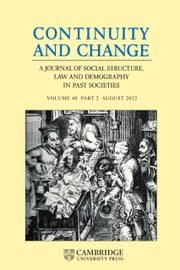No CrossRef data available.
Article contents
Introduction: Some ponderings on the use of the law in the writing of histories
Published online by Cambridge University Press: 30 October 2001
Abstract
Professional jurists are often inquisitive about the subject matter of their calling and in the course of their careers may well develop fascinating insights into the law and those who interpret it. Their employers, however, be they governments, corporations, firms, or private clients, rarely show similar enthusiasm for such insights unless the hours spent pondering the social or historical significance of this or that legal view have a contemporary value that justifies the lawyer's fee.
Thankfully, other members of society are rewarded for mining the legal records of the past. For legal historians, the search often focuses on the changing legal ideas and how legal doctrine develops over time to meet the changing needs of societies. Yet because the law generally deals with concrete matters – again, because jurists are paid by people who are unlikely to remunerate those who simply while away their hours making up legal cases – it offers a reservoir of information that can be used, albeit with caution, in fields other than just the history of the law.
A partial reconstruction of the law of any given time and place is among the more obvious historical uses of legal documents but statutes, practical decisions, and even theoretical texts can be used to advance other forms of the historical endeavour. Legal works often reflect the values both of jurists and society-at-large, for while the law creates social values it is not immune to changes in these very values.
- Type
- Editorial
- Information
- Copyright
- © 2001 Cambridge University Press


